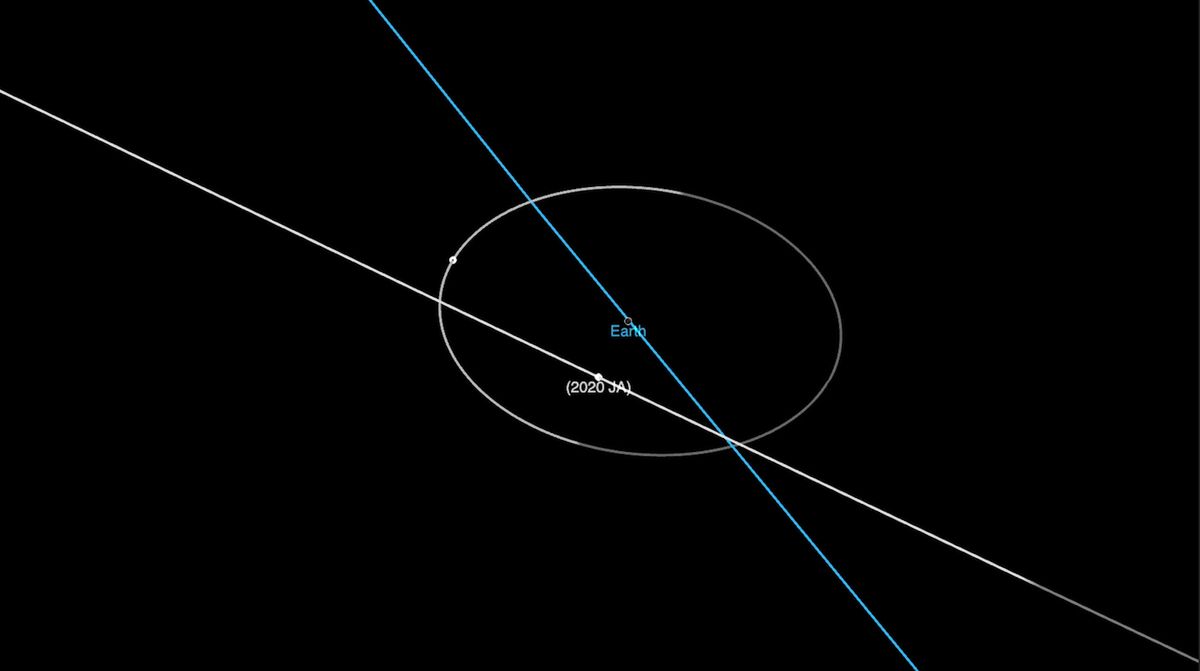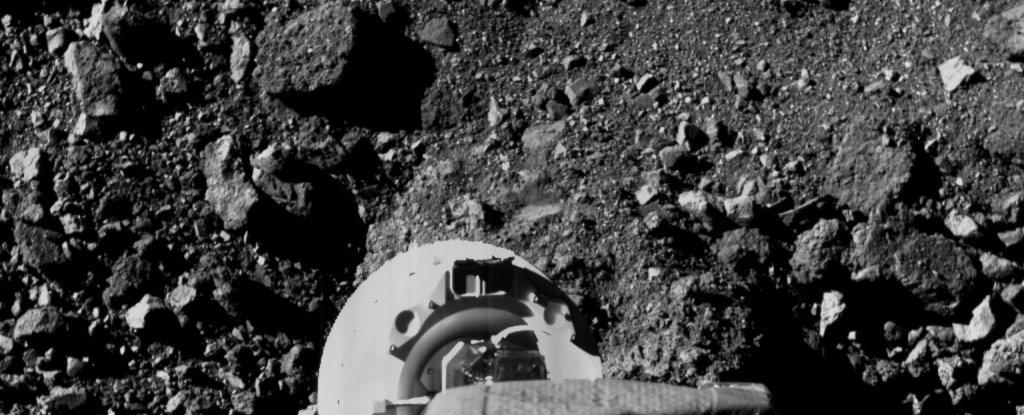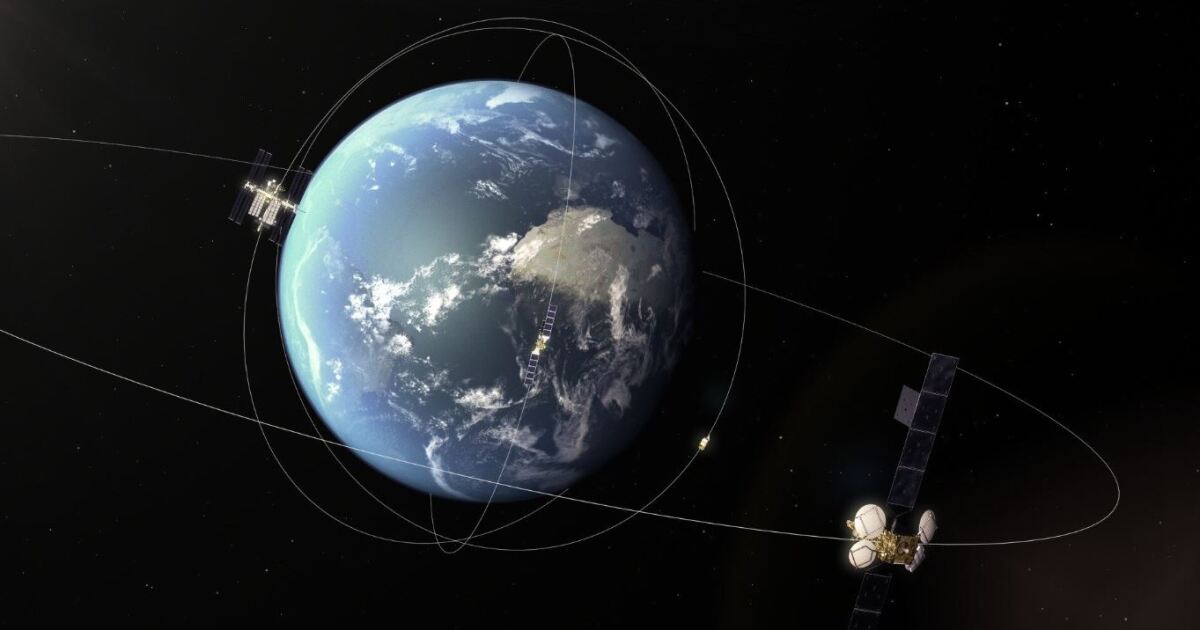
A newly discovered asteroid about the size of a bus will zip safely by Earth today (May 3), passing at a distance just over halfway to the moon.
The asteroid 2020 JA will fly by Earth at a range of about 148,000 miles (238,000 kilometers) when it passes today. That's about 0.62 times the distance between the Earth and the moon. (The moon is about 239,000 miles, or 385,000 km, on average.)
Asteroid 2020 JA is between 31 and 72 feet wide (9.6 to 22 meters), according to NASA's Center for Near Earth Object Studies . NASA's Asteroid Watch widget listed the asteroid's diameter as about 40 feet (12 m) and compared its size to a city bus.
Quite a lot has been going on:
Asteroid has close encounter with geosynchronous satellite
A small asteroid came within a cosmic hairbreadth of the ring of communications satellites circling the Earth in geosynchronous orbit this week. Passing by our planet at an altitude of about 35,000 km (22,000 mi), the object measuring four to eight meters (13 to 20 ft) in diameter whizzed past the nearest satellite on April 28, 2020, at 18:49 GMT at a distance of about 1,200 km (750 mi) on one of the closest Earth flybys ever recorded.
Geosynchronous or geostationary satellites sit in an orbital band above the equator where their orbital period is equal to the rotation of the Earth, meaning that they always remain over the same spot. These satellites form the backbone of the orbital telecommunications system and mission planners go to great length to make sure that the spacecraft don't interfere with one another.
NASA Spacecraft Just Dove 75 Metres Above an Asteroid's Surface, And The Photos Are Epic

NASA's OSIRIS-REx spacecraft is getting ready for its big moment. OSIRIS-REx (Origins, Spectral Interpretation, Resource Identification, Security, Regolith Explorer) is at asteroid Bennu, preparing to collect a sample of ancient rock. And collecting that sample means taking step after meticulous step.
OSIRIS-REx performed a series of rehearsal maneuvers in recent weeks. Each of these maneuvers brought it closer to Bennu's surface, before the spacecraft retreated into orbit again. Eventually, it will perform its risky touch-and-go sampling procedure.
This small asteroid zipped closely past Earth this week | Space | EarthSky

The European Space Agency (ESA) released this image April 30, 2020, of small asteroid 2020 HS7, which zipped past Earth shortly before a much larger asteroid – mile-wide 1998 OR2 – but coming much, much closer. The larger asteroid passed us at 16 times the moon’s distance. The smaller asteroid came close enough to sweep near satellites in Earth’s geostationary ring , sweeping by at about 23,000 miles (36,400 km).
* * *
2020 HS7 is estimated to be between 13 and 24 feet (4 to 8 meters) in diameter. It made its closest approach at 2:51 p.m. EDT (18:51 UTC) on April 28, 2020. Translate UTC to your time zone . Its passing wasn’t anything unusual. Lindley Johnson, Planetary Defense Officer and Program Executive for the Planetary Defense Coordination Office at NASA Headquarters in Washington, D.C., explained in a statement :
And here's another article:
What Did We Miss? Giant asteroid wearing "face mask" flies by Earth - WWAY TV

'What Did We Miss?' is our weekly comedy news segment. Every week Wills Maxwell Jr. gives a humorous report on the weird news stories that WWAY did not cover. This week's stories are:
Watch 'What Did We Miss?' every Thursday on Good Morning Carolina and News at 11. Catch up on previous episodes here.
Alan Edwards, Cathie Owen, Jack Dikian, Graham Lum, William Williams, Pam Linnett
It must have been a busy night for asteroids last Wednesday night as Asteroid 1998 OR2 passed within six million kilometres of Earth. Jack Dikian of Mosman reports that in order to single it out from others in the night sky, "ABC News reports helpfully suggested that distinguishing features such as hills and ridges on one end of 1998 OR2 set it apart from the others. Thank you ABC, I could have sworn I saw hills, big hills, odd looking hills.
"My sister needed her passport and searched high and low to no avail," writes Cathie Owen of Braidwood. "Her husband suddenly remembered a suitcase that had been packed during the bushfire emergency. Sure enough, all the family's important documents were there in the suitcase. We wonder now how many important documents are still hiding in suitcases.
Special Topic: Occultations by Asteroids - RocketSTEM

I n astronomy, an occu ltation – which comes from Latin words meaning "to hide" – occurs when one body passes in front of, and thus for a time hides, another body. (In this context, a solar eclipse can be considered as a kind of occultation.) In its most common usage, an occultation usually refers to the moon passing in front of a star, or sometimes a planet, but on rarer occasions it can also refer to a planet passing in front of a background star.
On March 10, 1977, the planet Uranus was predicted to occult the 9 th -magnitude star HD 128598 in Libra. A team of astronomers was using the Kuiper Airborne Observatory to observe the occultation with the intent of determining information about Uranus' atmosphere, however before the star passed behind Uranus it briefly disappeared and reappeared several times, and then did so again after re-emerging from behind Uranus.
... asteroid will travel near Earth | FOX 13 Tampa Bay

Happening on Twitter
A small asteroid the size of a bus will fly safely by Earth today https://t.co/PWHHR7NK0P https://t.co/Jy2bs6r3kA SPACEdotcom (from NYC) Sun May 03 15:57:07 +0000 2020
Tiny #asteroid 2020 HS7 will safely pass Earth just before 3pm EDT today at a distance of about 23,000 miles/36,400… https://t.co/YfkbWxIHOJ AsteroidWatch (from Washington, D.C.) Tue Apr 28 15:54:39 +0000 2020
A very small asteroid, named 2020 HS7, will safely fly by Earth just before 3pm ET today. Small asteroids safely pa… https://t.co/TQosPu9qWT NASA Tue Apr 28 18:26:49 +0000 2020
A (reasonably) small asteroid recently flew by Earth, passing close to satellites in geostationary orbit. Soon afte… https://t.co/UMr4Q2C34c esa (from Europe) Thu Apr 30 15:57:38 +0000 2020


No comments:
Post a Comment